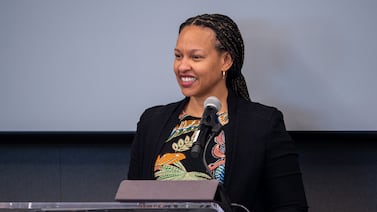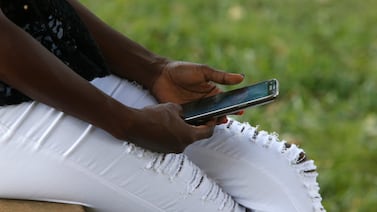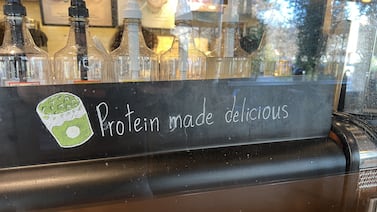This story was originally published at Capital B Atlanta. Public health, explained: Sign up to receive Healthbeat’s free Atlanta newsletter here.
While many doulas are women, one man is working to change the narrative about who can support families during childbirth.
Sylvester Pierce, 44, operates a doula business called Younity Birthwork, where he provides services ranging from childbirth education, postpartum care, and more.
“Doulas are there for the emotional, spiritual, and physical support of birthing parents. We operate as a comfort measure. We operate as a sounding board. My doula work is for families,” Pierce told Capital B Atlanta.
Since opening his business in 2023, Pierce said he has helped 12 different families, but he said his work began in an unprofessional capacity many years before as he helped members within his own family navigate pregnancy.
He said one of the events that drove him to get certification and training for birth work was helping his older sister cope with a miscarriage.
“The psychological effects, the physical pain, even having to go through burying a baby that you literally didn’t get a chance to see their eyes open, was hard,” said Pierce.
Pierce said his mission is to offer support and guidance for the Black women not just in his family, but for others in the community who face barriers and discrimination in the health care system during their pregnancies.
“Often Black women are not listened to, totally ignored. … Fear is with families knowing that you may die in these [hospitals] that are supposed to keep you alive — that’s horrible and scary,” said Pierce.
In 2021, Georgia had one of the highest maternal mortality rates in the United States, according to the Centers for Disease Control and Prevention. That same year, there were more than twice as many pregnancy-related deaths among Black women as white women in the state, according to the Georgia Department of Public Health.
“Having a doula has been shown to significantly reduce maternal death rates. Having us in hospitals has been shown to create a better environment for mothers when they’re coming in,” Pierce said.
In a conversation with Capital B Atlanta, Pierce talks about his journey as a male doula and how he’s working to ensure that every family, especially Black families, feels heard, supported, and safe on their birthing journey.
Capital B: What are some of your responsibilities as a doula?
So let’s say I’m working with a family. I want to give them as much education as possible. So my job is to answer questions that they have before they get into a situation where they are forced to make a life-changing decision immediately, without having all the information. I’m in hospital visits with them early on, I’m meeting with physicians early, we’re laying out every option that they have, and we listen to what they want.
How long have you been a doula?
I’ve been doing the work for about 20 years. … I just assisted the families around me as much as I could, starting with my sisters and then going to friends of mine that had children or were pregnant, and as I kept trying to assist more and started seeing some of the issues the community was having, that’s when I learned that I needed to get some actual training done. … So that was about maybe four or five years ago when I started actually taking the path to understanding more seriously, and I’ve been in about three years of training so far.
What propelled you to start getting professionally trained as a doula?
Watching Black women die unnecessarily. Every death that I saw was preventable: Either it was families not understanding that they really were in pain, or hospitals releasing them early. The amount of women that I knew, at least two women, that literally just bled to death. They had cycles that didn’t stop, and over the course of six months or a year, they just bled out.
For people interested in hiring a doula, what should they know?
I’m a community doula, and one of the groups that I associate with is the Georgia Community Doula Coalition, and we are there for the people first. We’re there for families first.
Consult a doula. Find one in your neighborhood. Find one that fits you. We come in all shapes and sizes — and a few of us come in different genders — but find one that fits you, and then consult with the midwife as well. Build your birth team, and actually have a plan and a process set up as you go through your journey. Look through programs that can take care of the fees for you, because we do have programs in Georgia that can pay us.
How has being a man shaped your experience in doing this work?
I’ve gotten my pushback here and there, and I am indebted to and grateful for the women who knew why I was on this journey and showed me that I was already on the path and also those who could say, “This brother was helping me as a doula, before he was a doula. He was helping me feed my baby, he himself had changed diapers, he was coming over, washing dishes and cutting the grass.” … I think if we allow the proper education, if we get men out of this tunnel vision of what they’re supposed to be, and let everyone operate in their natural state, if we dispel the homophobic views of what a family is supposed to look like … then we can have a space where it really won’t matter what your gender is; it will literally just be who’s here to help, and who’s here to keep this family healthy.
Alyssa Johnson is Capital B Atlanta’s enterprise reporter.





